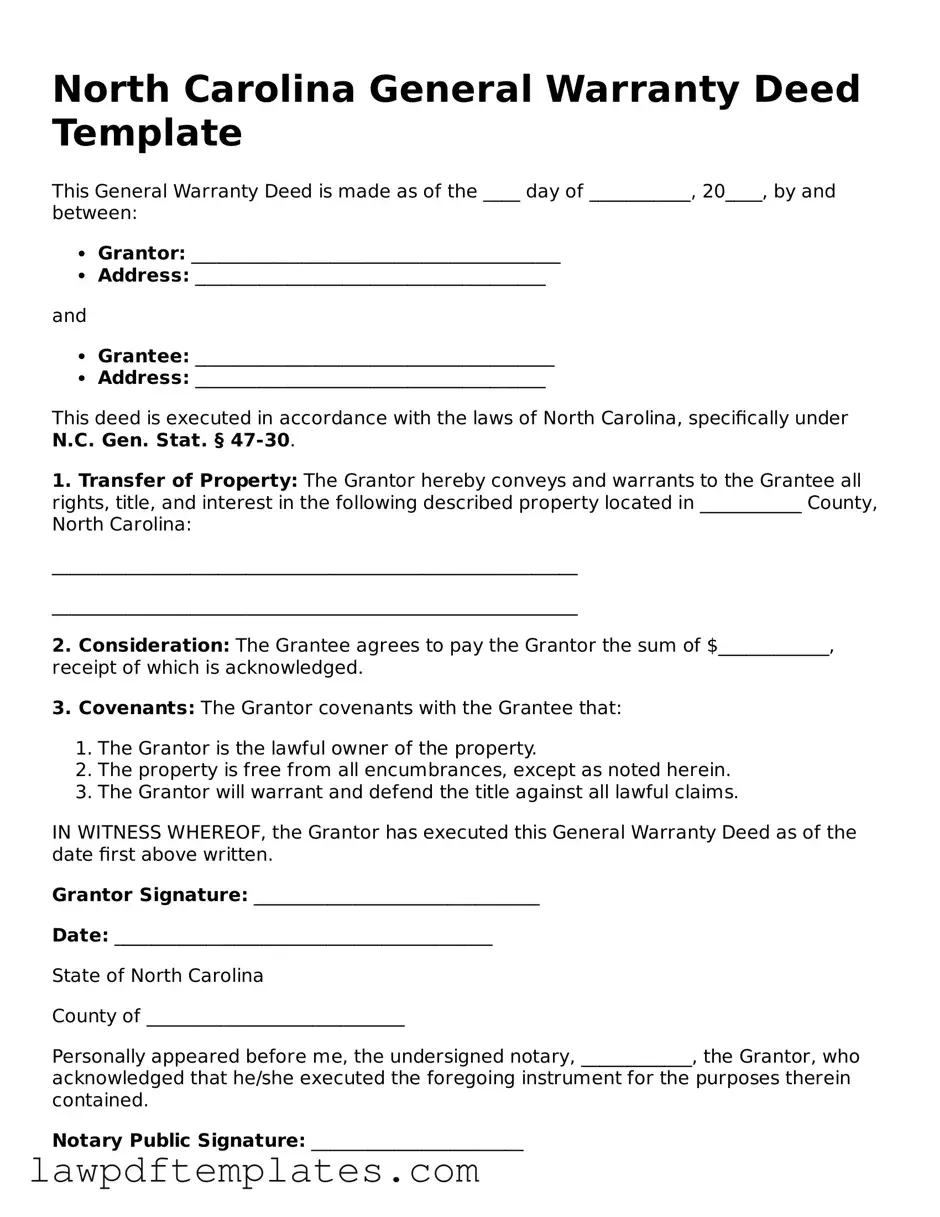Free Deed Template for the State of North Carolina
Form Breakdown
| Fact Name | Description |
|---|---|
| Purpose of the Deed | The North Carolina Deed form is used to transfer ownership of real property from one party to another. |
| Governing Law | This deed is governed by the North Carolina General Statutes, specifically Chapter 47. |
| Types of Deeds | In North Carolina, common types of deeds include General Warranty Deeds, Special Warranty Deeds, and Quitclaim Deeds. |
| Recording Requirements | To be legally effective, the deed must be recorded with the county Register of Deeds within 30 days of execution. |
Sample - North Carolina Deed Form
North Carolina General Warranty Deed Template
This General Warranty Deed is made as of the ____ day of ___________, 20____, by and between:
- Grantor: ________________________________________
- Address: ______________________________________
and
- Grantee: _______________________________________
- Address: ______________________________________
This deed is executed in accordance with the laws of North Carolina, specifically under N.C. Gen. Stat. § 47-30.
1. Transfer of Property: The Grantor hereby conveys and warrants to the Grantee all rights, title, and interest in the following described property located in ___________ County, North Carolina:
_________________________________________________________
_________________________________________________________
2. Consideration: The Grantee agrees to pay the Grantor the sum of $____________, receipt of which is acknowledged.
3. Covenants: The Grantor covenants with the Grantee that:
- The Grantor is the lawful owner of the property.
- The property is free from all encumbrances, except as noted herein.
- The Grantor will warrant and defend the title against all lawful claims.
IN WITNESS WHEREOF, the Grantor has executed this General Warranty Deed as of the date first above written.
Grantor Signature: _______________________________
Date: _________________________________________
State of North Carolina
County of ____________________________
Personally appeared before me, the undersigned notary, ____________, the Grantor, who acknowledged that he/she executed the foregoing instrument for the purposes therein contained.
Notary Public Signature: _______________________
My Commission Expires: _______________________
Common mistakes
When filling out the North Carolina Deed form, individuals often encounter several common mistakes that can lead to complications in property transfer. One frequent error is providing incorrect or incomplete names of the parties involved. It is essential to use the full legal names of both the grantor and grantee. Omitting middle names or using nicknames can create confusion and may invalidate the deed.
Another common mistake involves the description of the property. The property must be accurately described to avoid ambiguity. Failing to include the correct parcel number or a detailed physical description can lead to disputes or difficulties in establishing ownership. It is advisable to refer to previous deeds or property records to ensure accuracy.
Many individuals overlook the requirement for signatures. Both the grantor and any witnesses must sign the deed for it to be legally binding. A missing signature can result in the deed being deemed invalid. Additionally, some people forget to have the deed notarized. In North Carolina, notarization is crucial for the deed to be accepted by the register of deeds.
Inaccurate dates can also pose problems. The date of execution should reflect when the deed is signed, and any discrepancies can raise questions regarding the timeline of ownership. Furthermore, failing to include the proper acknowledgment can lead to rejection by the recording office. Acknowledgment is a formal declaration that the signature is genuine and made voluntarily.
Another mistake involves not checking for existing liens or encumbrances on the property. If the property has outstanding debts or legal claims, these can affect the transfer process. It is vital to conduct a title search before completing the deed to ensure a clear title is being conveyed.
Lastly, people often neglect to review the local laws and regulations governing property transfers. Each county in North Carolina may have specific requirements or forms that need to be adhered to. Ignoring these local nuances can result in delays or rejections when filing the deed. It is important to familiarize oneself with the relevant laws to ensure compliance and a smooth transaction.
Discover More Deed Templates for Specific States
Arizona Warranty Deed Form - Custom elements in Deeds can directly affect future dealings with the property.
In order to ensure a transparent property sale process in Texas, utilizing the Texas Real Estate Purchase Agreement form is crucial, and for those looking to access the template conveniently online, you can visit PDF Documents Hub to find the necessary resources.
Georgia Quit Claim Deed - Carefully review all fields on the Deed before submitting for recording.
